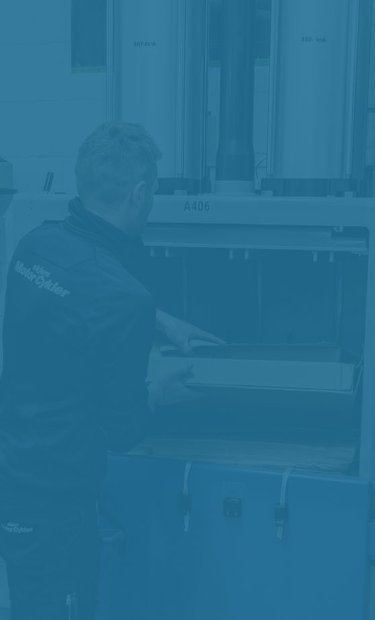
Recycling Compactor: An overview and recommendations
We often receive questions about compactors, recycling, and what a recycling compactor actually does. Let’s explore that topic here.
A brief overview of why you should use a recycling compactor
A recycling compactor is a device designed to reduce recyclable waste to smaller sizes by compressing the material and removing the air, which allows for more efficient storage and transportation.
This process not only conserves space but also promotes a cleaner and more hygienic working environment.
For recycling companies with the capacity to handle bulk materials, compacted waste is more desirable as it is easier to process – and for this reason, using a recycling compactor can actually transform your waste into a source of income.
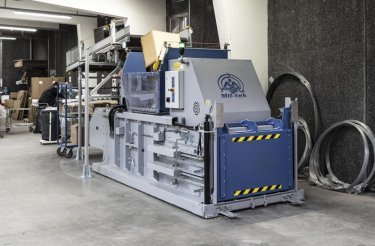
How recycling compactors work
- Loading: Recyclable materials like cardboard, plastic, or polystyrene are placed into the compactor’s input chamber.
- Compression: The compactor uses hydraulics, mechanics or pneumatics to apply pressure, reducing the volume of the materials by compressing them tightly. This process removes air and consolidates the materials into a smaller, denser form.
- Ejection: Once the material is compacted, it is typically bound with wire or plastic ties and ejected from the machine as a compact bale or block.
- Collection: The compacted bales are collected by a recycling company and transported to a recycling facility.
- Processing: At the recycling facility, the compacted materials are processed into raw materials that can be used to manufacture new products.
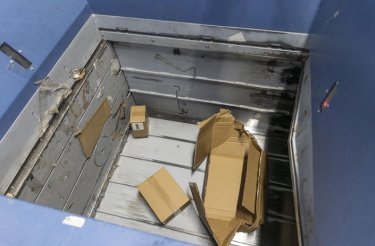
Types of recycling compactors
There are various types of recycling compactors tailored to specific recyclable materials, including:
- Balers for cardboard and plastic:
Ideal for compressing cardboard and plastic materials. - EPS compactors for polystyrene:
Designed to handle lightweight, bulky materials like polystyrene. - Insulation compactors for fibreglass insulation:
Used for compressing insulation materials.
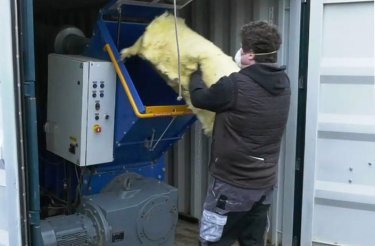
What kind of compactor do you need
for your business?
Whether a small business or a large enterprise, recycling compactors offer significant advantages in waste management. From small balers suitable for lower volumes of recyclable materials to large hydraulic and horizontal compactors for heavy-duty applications, these machines help businesses maintain a cleaner, more efficient operation.
Small recycling compactors – also called balers
Small businesses can benefit significantly from using a small recycling compactor, often referred to as a baler. Balers are ideal for compacting materials like cardboard and plastic into dense, manageable bales. This helps save space and makes it easier to transport and recycle these materials. They are perfect for businesses that produce a moderate amount of recyclable waste, such as:
- Hotels and restaurants: Efficiently managing waste from food packaging and disposable items.
- Canteens and industrial kitchens: Reducing food waste and packaging, keeping the environment clean and organized.
- Cafes and retail stores: Handling continuous waste in confined spaces, ensuring fast and efficient waste management.
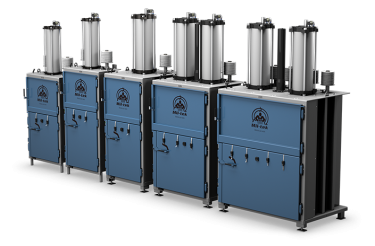
Large recycling compactors – heavy-duty machines
Larger businesses with higher volumes of waste can benefit from more robust recycling compactors, such as hydraulic or horizontal machines. These machines are designed to handle large quantities of waste efficiently, making them suitable for high-demand environments.
- Wholesalers and warehouses: Managing bulk packaging materials and reducing the volume of waste that needs to be handled and transported.
- Packaging industry: Compressing large amounts of packaging waste, streamlining the recycling process.
- Supermarkets and shopping centres: Handling large amounts of cardboard and plastic waste generated daily.
- Manufacturing and production: Managing industrial waste efficiently, reducing the space required for waste storage, and improving overall operational efficiency.
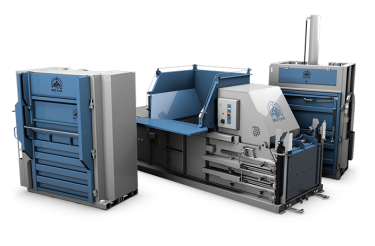
Several benefits of using recycling compactors
- Space saving: A baler or compactor allows for more waste than a regular bin, optimizing storage.
- Health, hygiene and safety: By keeping waste compacted, the waste area is less likely to attract insects and pests, making the workplace safer. Removing accumulated waste into a compactor also ensures a cleaner workspace and fewer tripping hazards.
- Improved productivity: Compactors maximize space in tight areas, improving staff mobility.
- Cost savings: Compacted waste occupies much less space compared to regular bins and takes longer to fill, reducing the frequency of waste removal – and therefore also operational costs.
- Greener environment: By reducing the volume of waste into recyclable bales, landfill use will decrease and greenhouse gas emissions from waste transport will decrease.
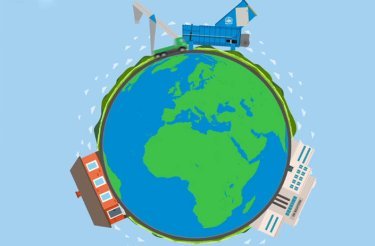
Are you up-to-date on recycling compactors now?
If not, or if you would like to know more about a specific solution for your business, you are always welcome to contact us.